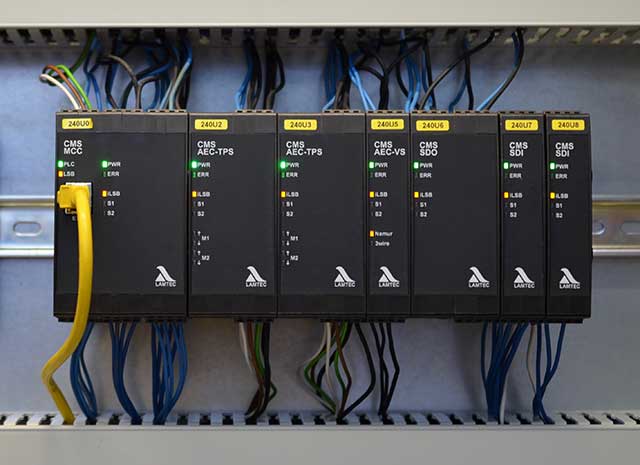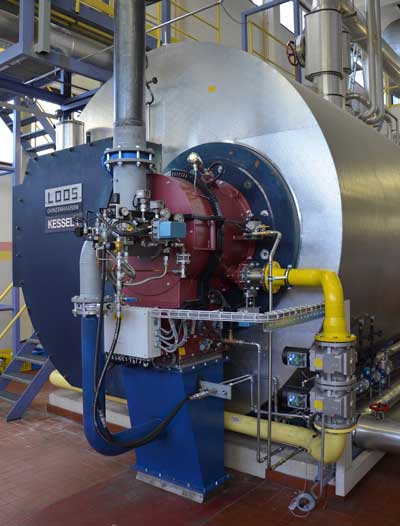 Modern burner management systems need to be flexible, scalable and cost effective. As applications become more complex, the demands on burner management controllers increase. Low-NOx burner technology and the popularity of biogas, off-gas, syngas and other exotic fuels require Burner management controllers to offer the flexibility to allow users to configure them to meet the needs of current application.
Modern burner management systems need to be flexible, scalable and cost effective. As applications become more complex, the demands on burner management controllers increase. Low-NOx burner technology and the popularity of biogas, off-gas, syngas and other exotic fuels require Burner management controllers to offer the flexibility to allow users to configure them to meet the needs of current application.
 A burner management systems performs several duties. The primary function is to ensure the burner can start up safely and reliably. During operation it is essential that any fault that could cause a hazardous situation is detected immediately and the burner is shut down in a controlled and safe manner. Faults such as loss of flame or air pressure are directly associated with the burner, but external faults, such as high process pressure and temperature, also need to be monitored and reacted to accordingly.
A burner management systems performs several duties. The primary function is to ensure the burner can start up safely and reliably. During operation it is essential that any fault that could cause a hazardous situation is detected immediately and the burner is shut down in a controlled and safe manner. Faults such as loss of flame or air pressure are directly associated with the burner, but external faults, such as high process pressure and temperature, also need to be monitored and reacted to accordingly.
Burner systems and design vary dramatically from simple single stage burners with ionisation flame detection through to complex large burners firing two or more fuels, with sophisticated flame scanners that can distinguish one flame from another or a flame from background radiation.
In the past, four channel outputs were enough to meet most burner applications. An output channel is defined as a hard-wired control output capable of positioning a servo motor or a variable speed drive for a motor, usually driving a fan but sometimes an oil pump. For more complex burner systems six or seven channel outputs are not uncommon. Examples of these are:
- secondary air fan (main combustion air)
- secondary air damper
- primary air damper
- oil valve servo motor
- gas valve servo motor
- flue gas recirculation damper
- burner sleeve
- oil pump
- atomising cup speed
Modern electronic systems enable drives to be individually adjusted allowing oxygen trim and CO control to be applied, both of which can significantly improve efficiency, and reduce fuel use and associated emissions.
LAMTEC’s new Combustion Management System (CMS) is a contemporary modular burner manager that offers complete flexibility to meet almost all burner applications. For applications that cannot be addressed using standard configurations and parameterisation, the CMS allows experienced customers to programme non-safety critical functions using CODESYS soft PLC IEC 61131-3 development software.
The heart of the CMS system is the (MCC) burner module: this is where the processors are located and has the inputs and outputs for the control of a basic burner. Additional modules are used to build the CMS into a full burner management system and include:
- TPS Modules – each controls one or two three-point step servomotors with potentiometer feedback
- VS Modules – allow control of 4-20mA devices with 4-20mA feedback – typically a VSD but could be pneumatic actuator. (TPS and VS modules can be combined to provide up to 10 channel drive outputs)
- SDI Modules– Safety Digital Inputs (up to 60 inputs available)
- SDO Modules– Safety Digital Output (up to 41 outputs available)
- SAI Modules – Safety Analog Input (9 failsafe or 18 non-failsafe inputs available)
- VS Modules can be assigned for Analog Outputs
- Fieldbus – interfacing to a number of standard Fieldbus protocols including Profibus DP and ProfiNet. Modbus TCP is included as standard on the MCC.
There is a choice of interfaces from a low-cost keypad to a number of high-resolution touchscreens.
When combined with Lamtec’s comprehensive range of flame scanners and in-situ zirconia oxygen and COe probes/analysers, the CMS provides a full combustion management solution that meets all relevant safety standards, addresses almost all combustion applications and helps reduce fuel use, costs and emissions.
The CMS is compatible with existing Lamtec System Bus devices and is fully scalable allowing additional functions, such as VSD fan control, oxygen trim and CO control to be added as and when required.
For further information contact Mick Barstow, export business development manager

